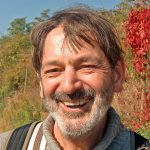Kohra interviewed at Tel Aviv airport by Yael Benaya, published in Haaretz on 18 December 2020.

This week at the Tel Aviv airport: A self-described ‘corona couple’ takes advantage of the pandemic to travel to central America, [and a real estate entrepreneur finds his own quiet corner on a kibbutz].
Kohra Yuval Itach, 40, and Noa Dolev, 35; live in Jaffa, flying to Mexico City
Hi, where are you off to?
Noa: Mexico, Guatemala and Costa Rica.
What are your plans?
Kohra: A lot of nature, beautiful places. The idea is a month of Mexico, a month of Guatemala, a month of Costa Rica. Between pyramids and historical sites, lots of nature and all kinds of alternative communities. We haven’t over-planned.
Noa: To go with the flow. Sea, freedom and books. To be open.
Why did you decide to stop everything and fly?
Kohra: With the coronavirus now, nothing is happening. We also understood that you can enter those three countries without quarantine, even without a test, so you take a break and go on a trip. I produce festivals and music shows, and just now nothing is happening. Business was killed for all of us but we also got a year off. It was always my dream to fly away and take a break from life.
What festivals do you produce?
Among others, the yoga festival at Givat Haviva, the Osho Israel [meditation and music] festival, a festival called Imagine, on Purim, and a Sufi festival at the Desert Ashram that’s about connections between Jews and Arabs.
Was it hard when everything came to a halt?
There were times when it was, but mostly not. There was a very powerful pause in the whole world at the beginning, and plenty of uncertainty, but I enjoyed it. I’ve been building up my business for 14 years, and that was a moment to make a stop. I started to get into other things. For example, I’m setting up a publishing house for Osho [the late Indian mystic Bhagwan Shree Rajneesh] in Hebrew, and there are also Osho tarot cards whose sales rocketed because of my efforts during the pandemic. It became a coronavirus hit that everyone bought for leisure time at home.
Is there a strong Osho community in Israel?
A lot of the Israeli scene of workshops, retreats and festivals is Osho. There’s an extensive community that’s influenced by him, leads their lives at his inspiration, meets up and does things. As a person whose name is strongly identified with Osho, after the documentary series [Netflix’s 2018 “Wild Wild Country,” about Osho’s community in Oregon], I get asked by everyone to explain it. A lot of interest was created, I know all the footage – including the parts that weren’t included in the series. Many people who saw it became interested in coming to the festival and hearing more. Bad publicity is still publicity, and I don’t think it was so bad; there was a lot of good publicity, too.
Has spiritual engagement increased during the crisis?
Noa: The stoppage led people to break off, dig deep into themselves and engage with themselves. A lot of people also really wanted to give themselves a gift during this period, and part of working on yourself is to give a gift.
What do you do?
Noa: I’m a facilitator of dialogue programs involving Jewish and Arab schools, and also nonviolent communication workshops. And I teach yoga.
What is nonviolent communication?
It’s an approach that teaches mindfulness and mediation, and explains how to forge a connection in a relationship. The idea is to distill what we want to say, to know how I feel and to see the Other, what he feels and needs. It’s a totally practical, applicable sort of language.
How did you get into this work?
At a seminar of the international Center for Nonviolent Communication, where we held a seminar with Jews, Palestinians and internationals. I saw that the method works; it was possible to hold a very charged dialogue in order to see the Other and understand. I remember that while we were there, there was a terrorist attack, and we heard both sides, their news and the news in Israel, and we were still able to maintain the conversation with all the contradictions and the conflicting truths, and be capable of listening. It was an amazing experience.
Does that also affect your relationship?
Kohra: We’ve been together 10 months, so part of it was to learn her language. I too have a background in other fields, involving individual development and awareness, psychotherapy workshops and many years of meditation in India.
How did you meet?
Kohra: We met four years ago at an event that I organized with a friend. But three years passed and we met again, and then the timing was appropriate. The coronavirus also helped.
Was the virus good for the relationship?
Noa: We started right before the corona. It gave us a hefty chunk of time together. Fast forward to being together.
Kohra: We’re a corona couple.
Read full article: www.haaretz.com
Note: Kohra is the founder of the International Osho Festivals which have been taking place in Israel for over 10 years. He is also instrumental in having books by Osho published in Hebrew, as well as the upcoming translation of the Osho Zen Tarot. www.oshoisrael.co.il




Comments are closed.